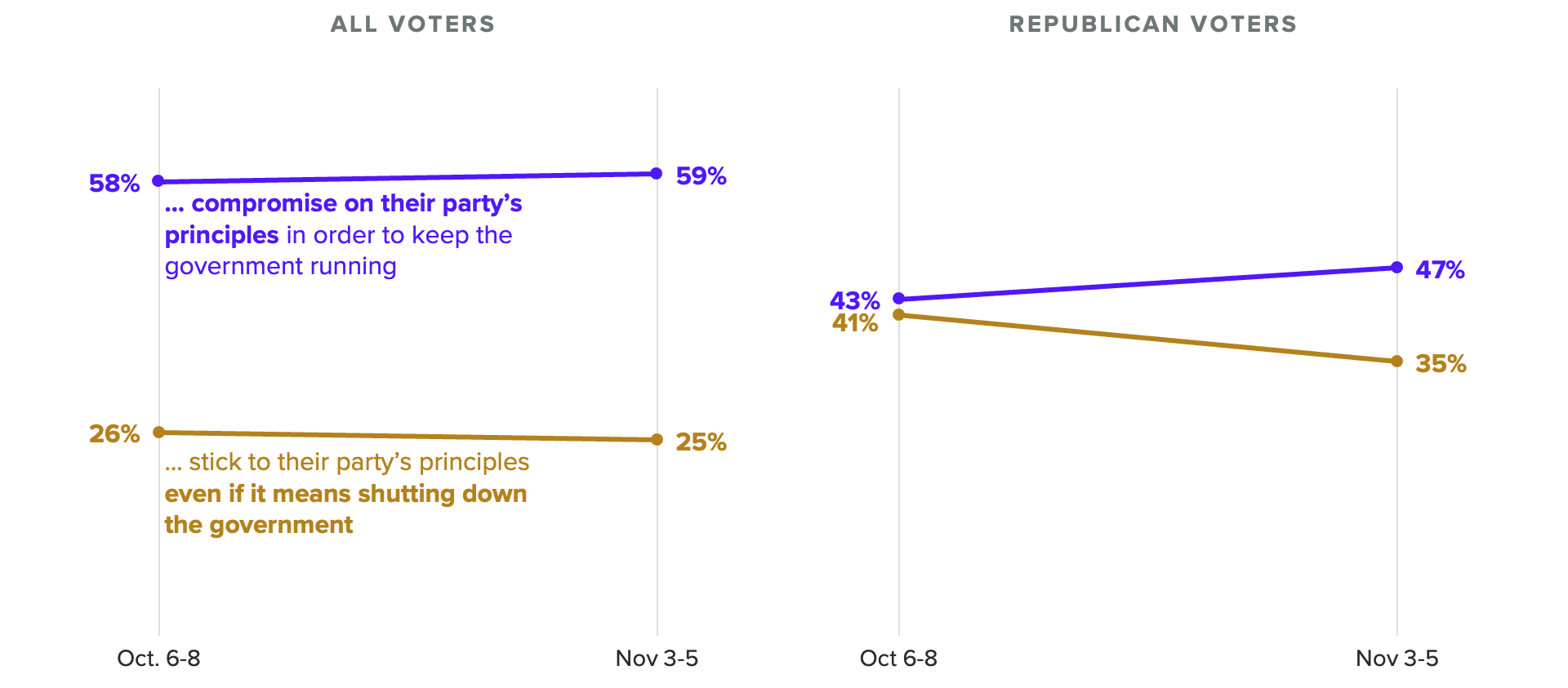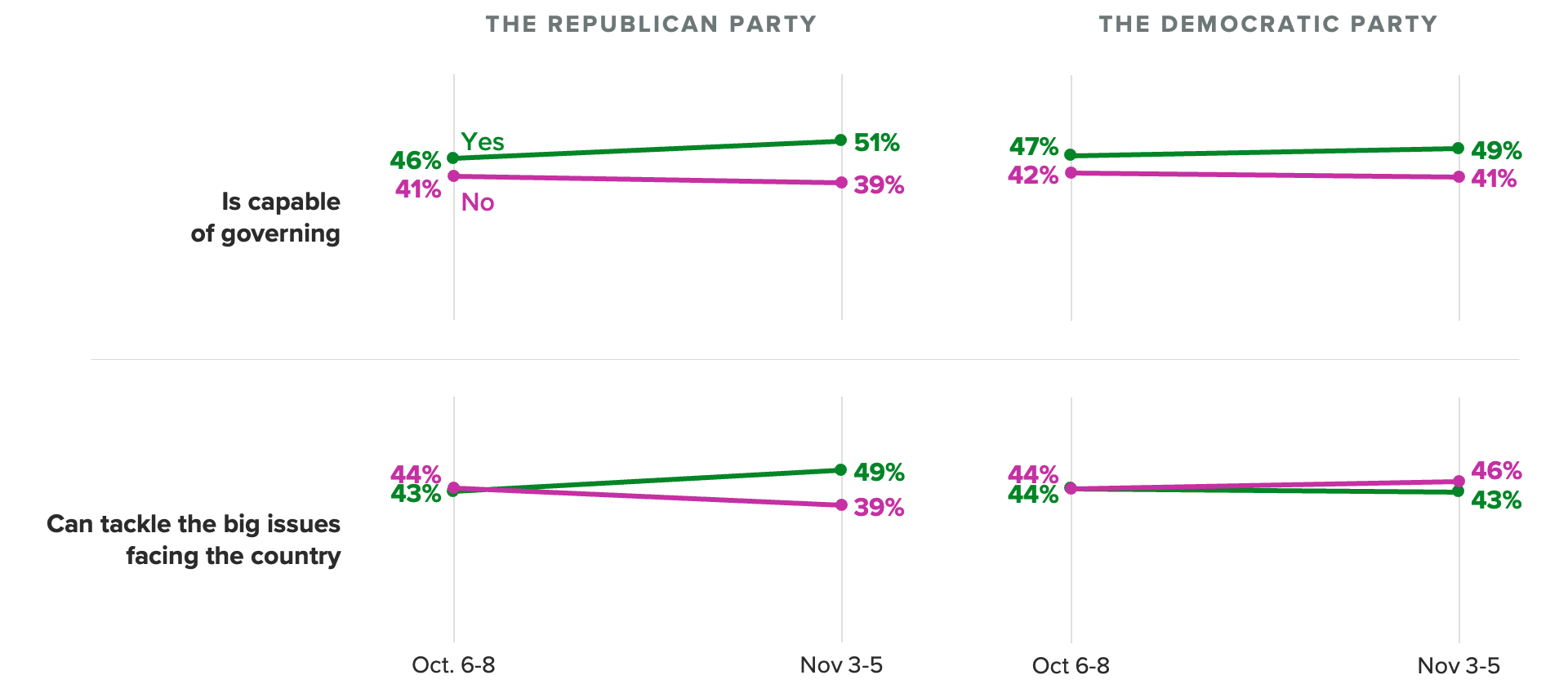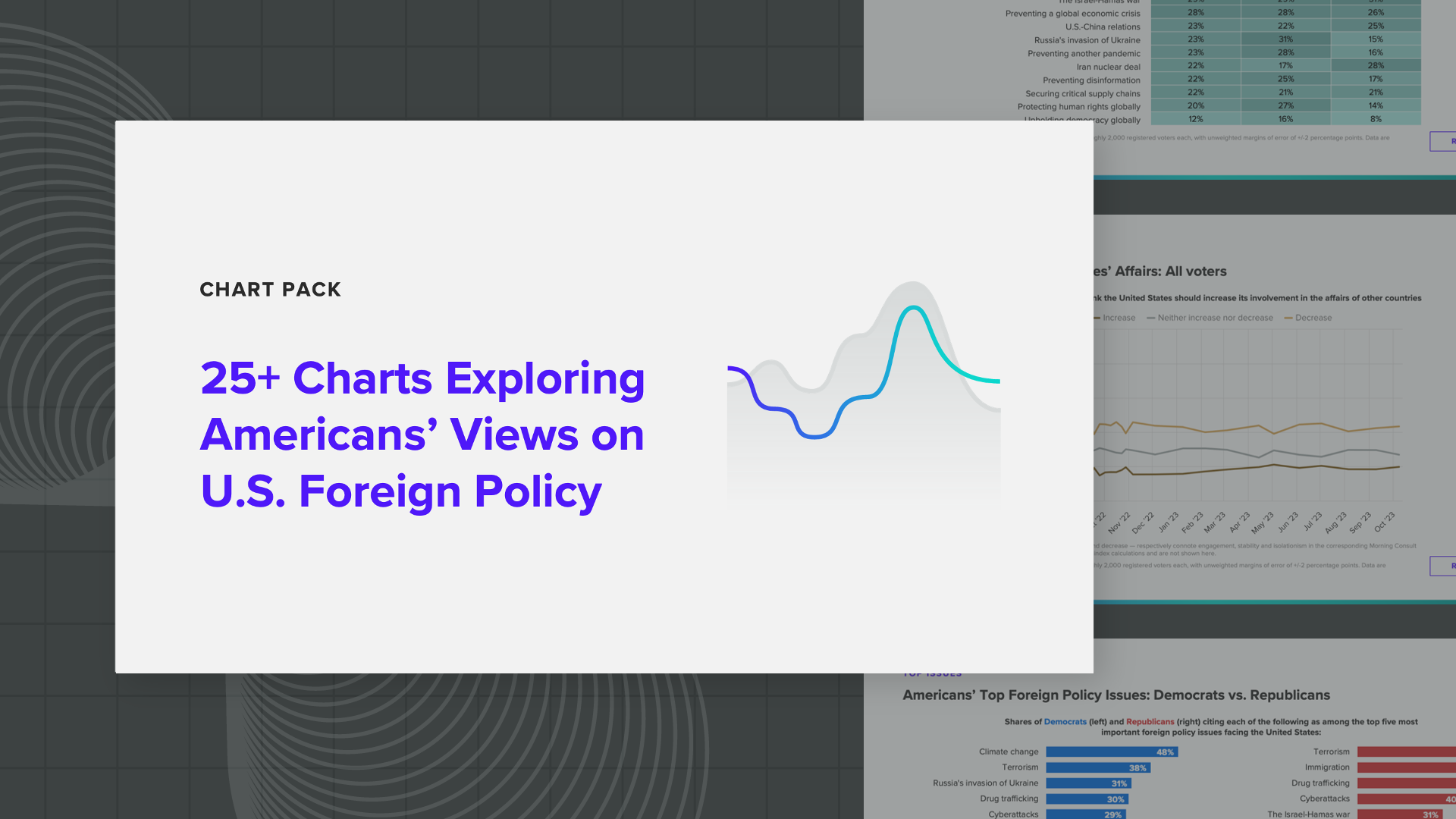Voters More Likely to See Border Security as Congressional Priority Than Israel Aid

Key Takeaways
A slim 52% majority of voters said increasing border security should be a top priority for Congress. But they care less about other issues in President Joe Biden’s national security supplemental funding request: Fewer than 3 in 10 voters said Congress should prioritize military assistance to Israel (28%), compared with 22% who said the same of Ukraine and 12% who said the same of Taiwan.
In seven key swing states, voters are similarly more interested in border security than overseas assistance. Relatively few of them agree with Biden’s call for the United States to become more involved in foreign affairs (20%), compared with 31% who want to maintain the status quo and 42% who would like to see less.
The Republican Party’s prioritization of border security in funding discussions is in line with the bulk of the electorate, which our data shows hasn’t soured on the GOP despite the weekslong speakership debacle and divisions over government spending. This presents a challenge for Biden and the Democratic Party on policy and political fights over the coming year, though Republicans have their own likely future infighting to deal with in the near future.
Sign up to get the latest data and analysis on how business, politics and economics intersect around the world.
With the fight over a government shutdown now over following a short-term bipartisan compromise, Capitol Hill is soon expected to grapple with President Joe Biden’s supplemental spending request for a range of domestic and — perhaps more prominently — foreign policy priorities such as Israel and Ukraine.
House Speaker Mike Johnson (R-La.) kept these issues out of the compromise government funding bill to avoid a pre-Thanksgiving shutdown. But as Congress enters its end-of-year legislative push and now faces two challenging spending deadlines early next year, the Biden administration’s best shot at securing passage of its broad foreign and military aid package may be playing up its funding for U.S.-Mexico border security.
Voters are more focused on domestic than foreign priorities
Our latest survey found that the White House’s domestic-focused priorities — especially enhanced security at the U.S.-Mexico border — are far more important to voters than any foreign assistance request.
Fewer Than 3 in 10 Voters Say Aid for Israel and Ukraine Should Be Top Priorities for Congress
The bulk of voters (52%) said increasing border security should be a top priority for Congress, just shy of the share who said the same of avoiding a government shutdown — an issue that will ripen again when lawmakers return from the winter holidays early next year. Interest in border security was driven largely by Republican voters, who were twice as likely as Democrats to say Congress should focus on that issue (72% to 36%).
In fact, Republican voters were more likely to say increasing border security should be a top priority than any other issue — including Biden’s impeachment, which the House Republican majority is continuing to pursue under Johnson’s leadership.
Specific demographics at scale: Surveying thousands of consumers around the world every day powers our ability to examine and analyze perceptions and habits of more specific demographics at scale, like those featured here.
Why it matters: Leaders need a better understanding of their audiences when making key decisions. Our comprehensive approach to understanding audience profiles complements the “who” of demographics and the “what” of behavioral data with critical insights and analysis on the “why.”
Among the overall electorate, there’s much less importance placed on other issues in Biden’s national security supplemental request. Fewer than 3 in 10 voters said Congress should prioritize military assistance to Israel (28%), compared with 22% who said the same of Ukraine and 12% who said the same of Taiwan. The shares of voters who said providing assistance to Israel and Ukraine is of top importance roughly match the shares citing the Israel-Hamas war and Russia’s invasion of Ukraine as top five foreign policy priorities, per our U.S. foreign policy tracker.
When it comes to the funding request itself, at least half of Democrats and Republicans back Biden’s proposal to boost Israel’s military, but severe partisan fissures emerge on funding for Ukraine and Taiwan. More Democratic voters than not back funding for Kyiv and Taipei, but Biden’s military assistance request for both allies is opposed by at least 3 in 5 Republican voters. Notably, Republicans’ reticence to fund Taiwan is sharply at odds with their tendency to be more geopolitically hawkish on China than Democrats, as our latest report on the state of U.S.-China relations shows.
Biden’s Domestic Spending Requests Are More Popular Than His Ones for Foreign Military Aid
Many of Biden’s domestic spending proposals are far more popular than his ones to boost foreign militaries. Nearly 3 in 4 voters back the White House’s request to bolster the Federal Emergency Management Agency’s disaster relief fund, just slightly higher than the share who support the billions of dollars Biden is seeking for U.S.-Mexico border security.
Beyond the national electorate, our latest surveys for Bloomberg News painted a similar picture in the swing states. In seven key battlegrounds, voters are similarly more interested in border security than backstopping American partners and allies militarily, underscoring a political challenge for Biden as he makes the case for more global intervention.
Only 1 in 5 Swing-State Voters Say the United States Should Be More Involved in Foreign Affairs
Relatively few swing-state voters agree with Biden’s call for the United States to become more involved in foreign affairs (20%), compared with 31% who would maintain the status quo and 42% who would like to see less. This mirrors trends we’ve observed among the overall electorate since the second half of 2022.
How voters view the GOP after the speakership fight
Washington’s latest government funding debate played out in the wake of a leadership crisis in the Republican-led House, where conservatives ousted Rep. Kevin McCarthy (R-Calif.) from the speakership due in part to his handling of the issue in late September. The House’s move to replace him with Johnson was more popular than not (43% to 26%), though 3 in 10 voters said they had no opinion or did not know about it.
Roughly half of voters said they didn’t know or had no opinion of Johnson after he was elected speaker late last month, which is mostly unchanged in recent weeks. But his decision to buck conservatives and compromise with Democrats to advance a “clean” stopgap government funding bill to avert a shutdown is in line with the views of the bulk of the electorate, and an increasing share of his own party.
GOP Voters Have Become More Likely to Say the House Speaker Should Compromise to Avoid a Shutdown

Nearly 3 in 5 voters — and just shy of half of Republicans — said it is more important for the House speaker to make concessions in order to keep the government running, rather than stick to their party’s principles even if it means a shutdown. Since early October, Republican voters have become more likely to support compromising over sticking to principles on the shutdown question.
Over the weekend, just 13% of voters said they had heard a lot about the potential government funding shutdown. This helps explain why Republican disputes over government spending — and the speakership debacle — have not damaged views of the Republican Party's competency to govern in the eyes of the electorate, which has improved since 2020.
Voters Don’t See the GOP as Less Competent Following the Speaker Chaos

About half of all voters (51%) said the Republican Party is capable of governing, similar to the 49% who said the GOP can tackle the big issues facing the country. Both figures mark an improvement since the speaker's fight kicked off in early October — and give the GOP slight advantages over the Democratic Party, about which public sentiment has been mostly stable.
The bottom line
The Republican Party’s prioritization of border security in funding debates is in line with the bulk of the electorate, which our data shows hasn’t soured on the GOP despite the weekslong speakership debacle and divisions over government spending. This presents a challenge for Biden and the Democratic Party on two fronts.
First, the president’s passionate push for American leadership on the global stage, especially when it comes to Ukraine, is far less in line with the electorate’s mood — meaning his repeated messaging on the issue is not breaking through to the public. Second, the GOP’s chaotic tenure in control of the House has yet to hamper its standing with the American public, which is more likely to trust it than the Democratic Party on Capitol Hill to handle a range of issues.
Still, the coming months will put the GOP’s trust advantage to the test as some prominent Republicans seek to elevate hot-button issues such as Biden’s impeachment to the top of the House agenda. Congress faces new government funding deadlines early next year that are expected to cause more internal division. And on top of all of this, the expected elevation of Donald Trump as the Republican Party’s 2024 presidential nominee next year — putting him center stage along with Biden — will further challenge whatever good graces the GOP faces today.
Eli Yokley is Morning Consult’s U.S. politics analyst. Eli joined Morning Consult in 2016 from Roll Call, where he reported on House and Senate campaigns after five years of covering state-level politics in the Show Me State while studying at the University of Missouri in Columbia, including contributions to The New York Times, Politico and The Daily Beast. Follow him on Twitter @eyokley. Interested in connecting with Eli to discuss his analysis or for a media engagement or speaking opportunity? Email [email protected].

